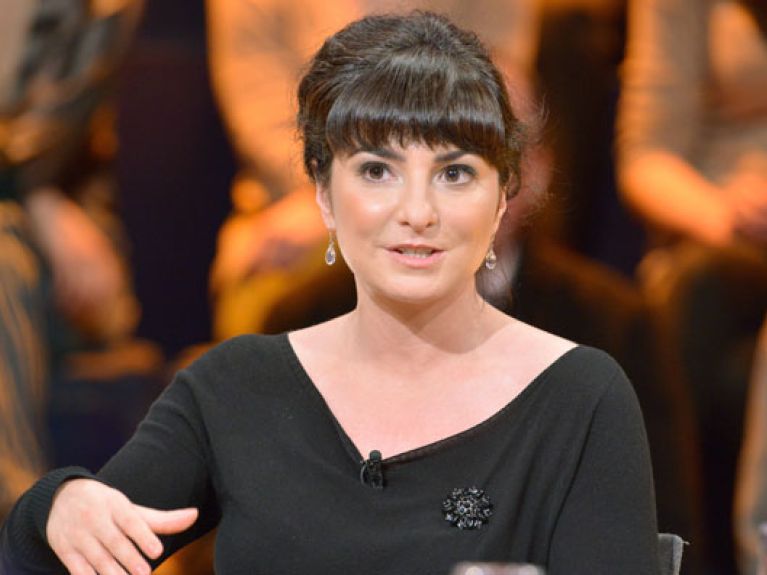“The international situation co-authors literary texts”
Mely Kiyak and other European writers brought the European Writers’ Conference into being in 2014. A conversation about literature in the European process.

Ms Kiyak, how should we imagine the atmosphere during the 2016 European Writers’ Conference?
Pensive. We talked a lot about why Europe is as it is and how it might also be. Both in the political and the discursive sense. Many of the debates taking place in the individual countries are often beside the point because of the imprecise use of language. To give you just one example. What exactly is an EU migrant? When Europeans move within Europe are we talking about migration?
You are one of the initiators of the European Writers’ Conference, which continues the idea of the 1988 International Writers’ Conference. What was the decisive idea behind reviving that event in 2014?
Precisely that. Our friend and colleague in the initiator group Tilman Spengler attended that conference in Berlin in May 1988. The heading then was “A Dream of Europe” and it anticipated what happened shortly afterwards: the fall of the Iron Curtain and the question of what would follow. A book of essays was published in which the participants dealt with the issue of what a Europe of Peoples could be. We felt that this and other questions are still incredibly topical today, and so we decided to organise a follow-up conference. Again in Berlin. Again in May. That was in 2014. Our conference was called “Europe – Dream and Reality”, an allusion to the motto back then. We also invited former participants, such as Ágnes Heller and György, to speak about the past. Our conference was strongly marked by the Ukraine-Russia crisis and the Gezi Park protests in Turkey. And it was so revelatory that we decided on another round, again with a topical reference: “Writing.Away.Borders”. We invited authors who had fled those countries and discussed not just numerous topical issues with them, but also what it means to do cultural work in exile.
Does something like a literary Europe exist – apart from such events?
First of all, there are no events at which writers meet and talk to one another. Language is just one of many barriers. We cannot talk without interpreters. Now to your question: we experience our different countries not through travel, but above all through stories. When I read the German version of a book by a Macedonian who tells me the story of his family – a story located in different countries and epochs – then I’m reading about Europe. Literature in its languages is the library of European life.
What would a Europe of Writers look like in concrete terms? Do joint projects exist?
A writer writes about the world, but is very lonesome. Writing is a lonely activity. Yet the writer’s devotion to the world can only come about when the production conditions are detached from that world.
Can literature grant a European identity nevertheless?
It has been doing that since Europe existed – from Greek myths to Shakespeare’s plays to Norwegian sagas and Jewish anecdotes. That is the way we have become acquainted with Europe.
A propos European myths: Europe is Don Quixote and the writer his Sancho Panza. This graphic comparison was made by Lithuanian author Eugenijus Ališanka in the manifesto for the 2016 European Writers’ Conference. Do you think that many authors currently identify with this role – of pointing to the discrepancy between imagination and reality in the service of a whole?
Although the author speaks for himself, he is always caught up in his context as well. The Kurdish author Yavuz Ekinci from Turkey has told us very impressively how one day he went out into the street and met Yazidis who had fled from the Sinjar Mountains. News of this did not come from the newspaper or the TV, but was standing right in front of him. Ekinci says: “It’s impossible not to respond to this. Whether you want to or not, it influences you.” Whether you are an author from Finland or from Israel makes a difference. Sometimes it is not the authors who write the texts, but the international situation. A story written by a Latvian could appear word for word in Turkish or Russian and it would be read differently each time. Here, too, it is not the author who determines what is read, instead a political context is adopted. Things are read into a text which are perhaps not there at all.
In your opinion, what power does literature have to make an impact on European processes?
As authors we may be political, but we are not actively involved in politics. That’s an important difference.
Given its ambiguity, “Writing.Away.Borders” was surely not chosen by chance as the motto of the European Writers’ Conference. Literature can describe conditions, but can it also change them?
Yes, whereby the borderline between a politically relevant story and manipulation or even propaganda is drawn by the language and the narrative perspective. The literature that has marked and moved generations, above and beyond languages and cultures, tells a good story and breaks down the world and its cosmos of relations into a family history. Literature written for the purpose of politically influencing readers is like sour milk. You take a mouth full and spit it out immediately because you notice that there is something wrong with it.
What does Europe mean to you?
Europe is an abstract place we have created in our imagination. Europe exists because we want it to. We have drawn borders and claimed that this is Europe, that whoever lives here is a European and belongs. But we can shift those borders, in either a peaceful or a military way. Not only people wander across borders, borders also wander across peoples. That’s a fact. So Europe is a place among places. And as is the case with places, they can be grotesquely glorified: home country, fatherland, mother earth. But they can also simply be lived in, without hyperbole. ▪

